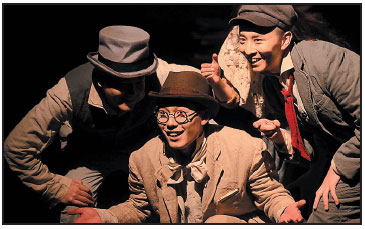Ulysses gains clarity on the stage
Irish writer James Joyce's classic modernist novel Ulysses is often called the world's most difficult-to-read book. But it may be easy for Chinese audiences to understand its essence by watching a play based on it.
Yi Liming, artistic director of Beijing Xinchan Theater, is teaming up with Andy Arnold, creative director of Tron Theater, Scotland, to bring the coproduction featuring Chinese performers to Hangzhou, Shanghai, Beijing and Nanjing in the spring of 2015.
"I never expected the play would come to China. It's so exciting," says its director Arnold.
"It's a very visual piece. Anyone can identify with the stories, such as the loss of a child, jealousy, anger and loneliness, which are all universal things. Hopefully, it will work for the Chinese audiences."
The novel depicts the encounters of advertising agent Leopold Bloom in Dublin on June 16, 1904. Ulysses is the Latinized name of Odysseus, the hero of Homer's epic poem Odyssey. Joyce wrote the novel to parallel Odyssey both in terms of characters and events.
"I've put in so many enigmas and puzzles that it will keep the professors busy for centuries arguing over what I meant, and that's the only way of insuring one's immortality," Joyce is quoted by Richard Ellmann as saying in the biography James Joyce in 1959.
But Arnold is confident he will create an understandable version onstage.
"The key to it is to have a writer who understands the book and presents us its essence," Arnold says.
The play tells the whole story of the novel but only uses about one-tenth of the dialogues in the original because some parts work better theatrically than others.
"The essence with all Joyce's works is that his language is written to be heard. You can't make sense of some of his writings, but when you speak it, it makes perfect sense because the sounds of language are what you will focus on," says Arnold, who has read the book two or three times.
He broke up the final episode of the book and put it in the whole play. The episode is about Molly Bloom's psychological descriptions when she lies in bed next to her husband Leopold Bloom. It's one of the most famous parts of modernist literature, due to its stream-of-consciousness technique and lack of punctuation.
"What makes good theater is the beauty of language, strong characters and great moments in life, such as tragedy and humor. All that is in the book," Arnold says.
When Yi and his team went to the 2013 Edinburgh International Festival in August 2013, they were attracted by a poster of Ulysses directed by Arnold and bought tickets to watch it out of curiosity.
"I was greatly impressed by the skillful ways to demonstrate such deep thoughts onstage. It's an excellent work and should be introduced to China," Yi says.
This time, Arnold uses Molly Bloom on her bed in the poster.
"Had we had a poster image of James Joyce in the dark streets of Dublin, that would put many people off," he says, jokingly.
It's Arnold's first time working with Chinese performers, and he's found it very enjoyable.
"The Chinese performers are young but quick learners. There are different types of performers in the world but they are very similar. For example, some are good at voices and some have a sense of humor," he says.
The coproduction is one of the six plays of the China-UK Literary Theater Exchange event. The three British plays are Ulysses, A Journey Around James Joyce and Becket in Brief. The three Chinese plays are Imperial Express, Waiting for Ancestors and The Seven Sages. All are performed by Chinese.
Written and directed by Arnold, A Journey Around James Joyce tells the story of Joyce and his wife, Nora Barnacle. Becket in Brief is about the life of Joyce's close friend Samuel Barclay Beckett, an Irish novelist and playwright, who wrote the absurdist play Waiting for Godot.
"I want to emphasize the literariness of theater and regain theater literature's rightful position, by introducing these fantastic works," says Yi, who has bigger plans for the future.
He says Imperial Express is set in the background when the Eight-Nation Alliance invaded and occupied Beijing in 1900. After the cooperation with the United Kingdom this time, maybe he can work with directors from the seven other countries, such as Germany and the United States, each year, to see what influences will be brought to the development of Chinese drama.
xulin@chinadaily.com.cn
|
A scene from A Journey Around James Joyce, a British play featuring Chinese performers .It is among six plays during the China-UK Literary Theater Exchange in March and April. Provided to China Daily |



















